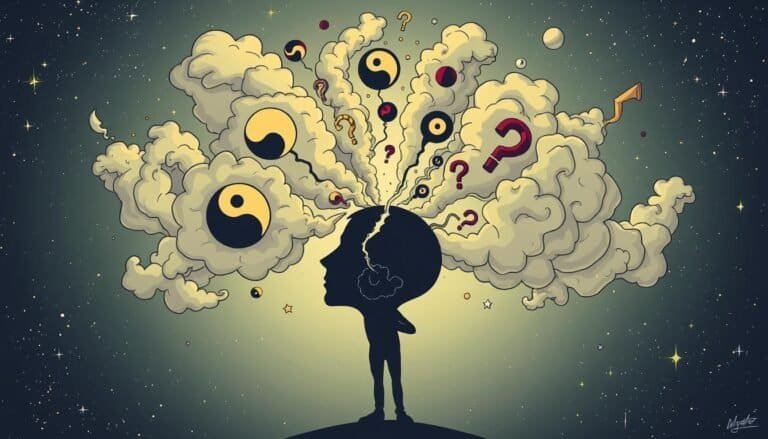Philosophy of Human Nature: Key Theories
What if our true nature is more about our surroundings than our genes? The Philosophy of Human Nature looks into this idea. It explores theories that try to explain our moral and ethical sides. From Aristotle’s view of humans as “Rational Animals” to today’s debates on selfishness and morality, these ideas offer deep insights into our actions and reasons.
Each theory shows how complex we are and makes us think about our moral values. As we dive into this topic, we’ll see how old ideas still shape our political and moral talks today.
Key Takeaways
- The exploration of human nature significantly impacts moral and ethical evaluations.
- Aristotle’s influence remains central in discussions about rationality and community.
- Contemporary views often contrast nature versus nurture in human development.
- Neurophilosophy offers modern insights into emotionality and decision-making.
- Understanding human nature involves a blend of philosophical, biological, and sociological perspectives.
- Key theories reflect different historical contexts and challenges traditional assumptions.
Understanding Human Nature in Philosophy
Exploring human nature is key in philosophy. Philosophers look into how it affects our morals and ethics. They see human nature as a guide for social rules and ethical choices, leading to different views on what’s right and wrong.
Historically, there have been debates on what human nature truly means. Some believe it has a deep, inherent meaning. Others think it’s shaped by culture. Western philosophy has greatly influenced today’s discussions. Aristotle, for example, saw humans as rational and social beings, setting the stage for future debates.
Claims about human nature can be divided into intentional actions and non-intentional traits. This shows how complex the topic is. It’s crucial for understanding why we act the way we do. The rise of modern humans 50,000 years ago is key to these discussions, influenced by earlier societies.
Thinkers like Darwin, Freud, Marx, and Nietzsche have changed how we see human nature. Confucian thought, through Mencius, believes humans are naturally good. It says moral virtues come from our natural qualities. Mencius suggests we develop morally by thinking deeply and recognizing our values before seeking personal happiness.
In conclusion, exploring human nature opens up deep philosophical discussions. These debates are shaped by history and varied viewpoints. They encourage us to think deeply about what makes us human.
Historical Perspectives on Human Nature
The study of human nature has changed a lot over time. It was shaped by ancient ideas from Greece and China. Thinkers like Socrates, Plato, and Aristotle have greatly influenced how we see human nature today.
Plato started the Academy in 388 B.C.E. He taught about personal morality and four key virtues: wisdom, courage, temperance, and justice. His ideas still affect how we talk about philosophy.
Aristotle built on earlier thoughts, adding ideas about purpose and reason in human nature. He helped us understand why we make choices and act the way we do. His theories made us think about how we fit into society.
The 18th century’s Age of Enlightenment was a big change in how we viewed human nature. Thomas Hobbes, John Locke, and Jean-Jacques Rousseau had different opinions on what makes us human. Hobbes thought people are naturally negative and self-focused. Locke saw humans as cooperative and rational. Rousseau believed society corrupts our natural goodness.
These views sparked lively debates and shaped today’s philosophical discussions.
Sigmund Freud later added a psychological layer, talking about the id, ego, and superego in our minds. He said these parts influence our actions and decisions. Meanwhile, Karl Marx argued that our nature comes from our social connections, not just our individual traits.
Philosophy of Human Nature: Key Theories
The philosophy of human nature looks into what makes us human. It covers many theories that help us understand ourselves better. One important idea is the “Original Human Nature” from Unification Thought philosophy. It says humans were made like God but lost their true nature because of a fall.
Looking into different philosophies gives us new insights. Existential thinkers like Kierkegaard and Sartre focus on our personal experiences and being true to ourselves. Kierkegaard talks about our journey to find our true selves, touching on our relationship with God.
Economic ideas also connect with these deep thoughts. Adam Smith looked at how people behave and found common traits across cultures. He saw how our nature affects our economy and how we interact with others. Smith believed in free trade and spoke out against unfair business practices, linking our nature to economic ethics.
In summary, various theories help us understand human nature in many ways. From exploring our original state to existentialism and economics, these ideas keep philosophers thinking. They challenge old ideas and encourage a deeper conversation about what it means to be human.
| Theory | Key Concepts | Philosophers/Thinkers |
|---|---|---|
| Original Human Nature | Human beings created in the image of God; loss of Original Nature | Unification Thought |
| Existentialism | Focus on individual experience and authenticity; stages of self | Kierkegaard, Heidegger, Sartre |
| Economic Philosophy | Influence of human nature on economics and international relations | Adam Smith |
The Traditional Package in Human Nature Theories
Exploring human nature has always been about the traditional package. This idea comes from Aristotle’s work. His ideas changed how we see humanity, offering views that last to this day. He showed that being rational is key to what makes us human.
Aristotle’s Influence on Human Nature Thought
Aristotle believed in a three-part soul theory. He said reason should lead the other parts of human nature. This idea comes from Plato’s idea of the soul linked to eternal Forms. Aristotle’s views made reason a key part of human life and happiness.
He saw humans as rational animals. This means we can think deeply, live morally, and interact with others in complex ways. The debate between reason and other soul parts affects ethics in philosophy. Looking at this idea shows how virtues like justice and courage come from thinking rationally.
Concept of the Rational Animal
Aristotle’s idea of the rational animal sums up what makes us human. It says we can think and make choices, which lets us live morally and interact with others deeply. This view brings up questions about ethics and how we should live.
| Philosopher | Key Contributions |
|---|---|
| Aristotle | Defined the rational animal; established the three-part theory of the soul emphasizing reason. |
| Plato | Introduced the concept of Forms; highlighted the eternal nature of the soul. |
| Descartes | Argued for human uniqueness based on rational abilities and linguistic complexity. |
| Sartre | Contested traditional notions; emphasized personal choice in defining human essence. |
Understanding these philosophers helps us see the traditional package’s impact today. It shows how old ideas still shape our views on being human. The mix of reason and living ethically is a big part of philosophy.
Nature vs. Nurture in Human Development
The debate between nature vs. nurture has been ongoing for decades. It looks at whether our genes or our environment shape who we are. This debate is key in fields like psychology and education, where understanding human development is crucial.
Early thinkers like Sir Francis Galton thought our genes mainly decide our smarts. This led to the eugenics movement, pushing for smart people to have more kids. Now, we know that while genes set limits, our environment greatly affects how we perform and behave.
In psychology, there are different views on this debate. Biopsychology looks at how our brain chemicals affect us, supporting the nature side. Social psychology looks at how our friends and surroundings shape us, fitting the nurture view. For example, Chomsky believed we’re born knowing how to talk. But Bandura showed how we learn from others.
When it comes to mental health, both nature and nurture are important. Our genes can make us more likely to have mental health issues. But our environment also plays a big role. The diathesis-stress model shows how genes and life events work together to affect our mental health.
Most traits, like how smart we are or our personality, come from a mix of nature and nurture. Research says about half of our IQ is due to our genes. But, we’ve seen IQ scores go up over time, showing nurture’s impact.
Epigenetics adds more complexity, showing how our environment can change how our genes work. This means our genes aren’t set in stone. Today, we see how nature and nurture work together to shape us.
| Aspect | Nature | Nurture |
|---|---|---|
| Intelligence | Genetic predispositions, heritability estimates of around 50% | Environmental influences, improvements noted in scores over generations |
| Mental Health | Genetic markers associated with disorders | Environmental factors such as trauma impacting outcomes |
| Language Development | Nativist theories propose innate language capabilities | Social learning theories emphasize environmental exposure |
| Personality | Studies show genetic similarities in identical twins | Interactions with caregivers and experiences shape personality traits |
Evolutionary Biology and Human Nature
Evolutionary biology and human nature work together to help us understand ourselves better. This field shows us that Darwin’s ideas challenge the idea of a fixed human nature. Instead, it says that we change and adapt over time.
It makes us think differently about what we believe about ourselves. It invites us to look into how our behaviors and traits come about.
The Implications of Darwinian Thought
Darwin’s ideas change how we see human nature. They tell us that our actions change based on our surroundings. Learning started as far back as 600 million years ago.
Studies show that many animals, including humans, learn and adapt. For example, chimpanzees use tools and have social behaviors. This shows that our actions come from both our genes and our environment.
Challenges to Fixed Human Nature
Today, we question the idea of fixed human traits. Our genes do shape our behavior, but we also have control over our instincts. Most species that lived in the past are now gone, showing how the environment shapes us.
Our self-centered views often ignore how society affects our diversity. Evolutionary biology helps us understand what makes us tick. It moves us away from the idea that we are blank slates towards a more complex view of human nature.
Major Theories of Human Nature
Philosophers have always been curious about human nature, leading to many theories. Hobbes, Locke, and Rousseau are key thinkers in this area. They show how different views on human nature shape our morals and society.
Hobbes, Locke, and Rousseau’s Views
Hobbes, Locke, and Rousseau had different ideas about human nature. Hobbes believed people are mostly self-focused and need a strong government to keep peace. Locke thought people have natural rights and can live together well in society.
Rousseau disagreed, saying humans are naturally good but society makes them bad. These views have greatly influenced philosophy.
Modern Alternatives to Fixed Concepts
Today, we have new ideas about human nature that go beyond old theories. These ideas suggest that people can change and grow over time. They also say that culture and environment shape who we are.
This change in thinking can be traced back to big events like the start of farming about 12,000 years ago. This event changed how humans lived and organized themselves.
| Philosopher | View on Human Nature | Key Influence |
|---|---|---|
| Thomas Hobbes | Self-interested and in need of a strong government | Leviathan (1651) |
| John Locke | Inherent rights and capable of cooperation | Two Treatises of Government (1689) |
| Jean-Jacques Rousseau | Inherently good, corrupted by society | The Social Contract (1762) |
These classic thinkers and modern thinkers keep debating about human nature. Their discussions show us that our understanding of human nature is always changing. This leads to deeper insights into who we are.
Traditional Slogans and Their Relevance Today
Traditional slogans about human nature, like seeing humans as rational and political beings, still shape our thoughts today. These ideas make us think about ethics and how we govern ourselves. They are backed by history and still talked about a lot today.
Understanding human nature is key to knowing what’s right and wrong in society. Old thinkers said humans have certain traits that shape our actions and choices. Aristotle believed in our rational side, saying we find happiness through thinking deeply and being active in our communities. This idea is still important, making us think about our role in politics and society.
Another old slogan says humans are meant to live in groups, wanting to belong and connect with others. This idea affects how we think about fairness, community, and leadership. It shows the need for places where people can grow together, building a world based on teamwork and respect.
Here’s a brief table summarizing key traditional slogans and their implications:
| Traditional Slogan | Contemporary Application |
|---|---|
| Humans as Rational Animals | Encourages informed participation in democracy and decision-making. |
| Political Animals | Emphasizes the necessity of civic engagement in shaping society. |
| Humans as Social Beings | Supports initiatives that enhance community connections and collective welfare. |
| Inherent Moral Sense | Promotes ethical frameworks in governance and corporate conduct. |
Looking back at these slogans shows how they’re still important today. They make us think about why we do things, our duties, and the systems that help or hurt ethical living. These thoughts link old ideas with today’s debates, helping us understand ourselves better.
Philosophical Inquiry of Human Nature
Philosophers deeply explore the complex nature of humans. They question if human nature truly exists. The debate includes essentialist and nomological views. These ideas help us understand our ethics and moral judgments, which guide our society and how we interact with each other.
Understanding Human Nature Through Philosophy
The essentialist view believes human nature has unique traits. On the other hand, the nomological view says it’s shaped by our evolutionary past. This gives a flexible view of what being human means.
Philosophers like David Hull argue against essentialism. They point out the differences within species and the trouble in finding fixed traits. Critics of the nomological view say it includes too many traits, losing sight of what’s truly human. This debate helps us see that different views shape our understanding of human nature.
The Impact on Ethics and Morality
Philosophical thought deeply affects ethics. In the 18th century, anthropology aimed to understand human nature. Today, it’s a more scientific field. Old ideas about the soul have evolved into modern concepts of the mind, focusing on our thinking and moral abilities.
Many old philosophical ideas are no longer popular. Yet, the debate remains crucial for ethics. By exploring these ideas, we learn how they shape our moral thinking and society.
| Viewpoint | Description | Philosophical Relevance |
|---|---|---|
| Essentialism | Claims human nature consists of unique properties distinct to humans. | Highlights the debate around defining human traits. |
| Nomological | Suggests human nature consists of traits influenced by evolutionary history. | Promotes a more adaptable view of human characteristics. |
| Philosophical Anthropology | Focuses on the study of human nature historically. | Bridges the gap between philosophy and empirical study of humanity. |
Conclusion
Understanding human nature is key in today’s moral and ethical talks. Thinkers like Thomas Hobbes and David Hume have deeply influenced how we see society and what drives us. Hobbes believed a strong leader was needed to keep peace and cooperation. Hume, on the other hand, saw human actions as more complex, involving emotions and morals.
Looking at human nature shows us why we need to keep talking about old and new ideas. These discussions help us deal with new problems and tough choices. For example, Hobbes thought people mainly looked out for themselves. But now, we see humans have many reasons for what they do, including both personal goals and group duties.
Studying the depths of human nature is still crucial. By looking at Hobbes and Hume’s ideas, we see how they still matter today. This helps us understand how their thoughts affect our world. It also guides us in building ethical rules that fit our human nature.
Source Links
- A Neuro-Philosophy of Human Nature: Emotional Amoral Egoism and the Five Motivators of Humankind | OpenMind
- Human Nature
- Human nature
- Enlightenment and Theories on Human Nature
- Philosophical Issues: Human Nature – Plato and Freud
- Marx’s theory of human nature
- Theory of the Original Human Nature – Unification Thought
- Human Nature as the Foundation of Adam Smith’s International Theory | Adam Smith Works
- Human Nature: A Reader
- Lecture Notes for Chapter 2: Philosophy of Human Nature
- Thirteen Theories of Human Nature [7th ed.] 0190604727, 9780190604721 – DOKUMEN.PUB
- What to Know About Nature vs. Nurture
- Nature vs. Nurture in Psychology
- Nature vs. Nurture Child Development: Exploring Key Differences
- Human nature, cultural diversity and evolutionary theory
- human nature – from blank slate to evolutionary biology
- Xunzi (Hsün Tzu) | Internet Encyclopedia of Philosophy
- Mencius
- Does Human Nature Exist? On the Philosophy of Human Nature
- Philosophical anthropology | Definition, History, Theories, & Facts
- Hobbes, Thomas: Moral and Political Philosophy
- David Hume







